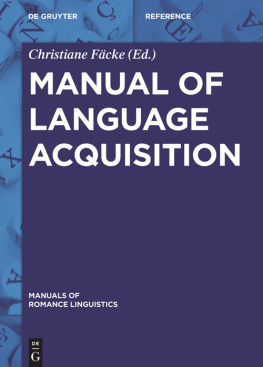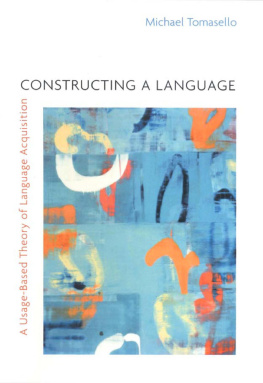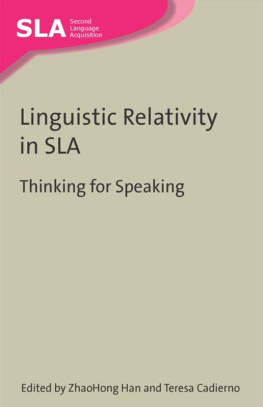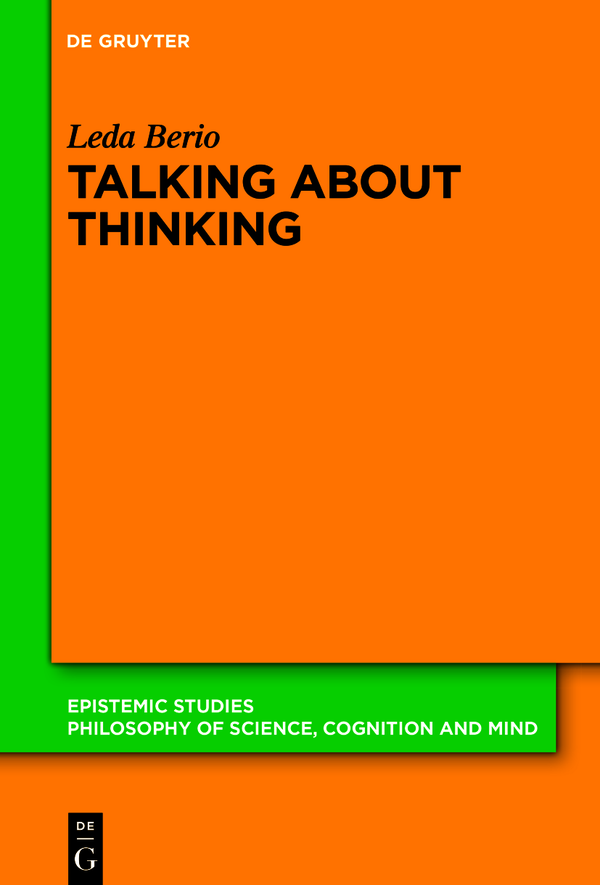Epistemic Studies
Philosophy of Science, Cognition and Mind
Edited by
Michael Esfeld
Katalin Balog
Vera Hoffmann-Kolss
Max Kistler
Beate Krickel
Anna Marmodoro
Alyssa Ney
Hans Rott
Wolfgang Spohn
Gottfried Vosgerau
Stephan Hartmann
Claus Beisbart
Albert Newen
Craig Callender
Tim Crane
Katja Crone
Ophelia Deroy
Mauro Dorato
Alison Fernandes
Jens Harbecke
Volume
ISBN 9783110748437
e-ISBN (PDF) 9783110748475
e-ISBN (EPUB) 9783110748550
Bibliographic information published by the Deutsche Nationalbibliothek
The Deutsche Nationalbibliothek lists this publication in the Deutsche Nationalbibliografie; detailed bibliographic data are available on the Internet at http://dnb.dnb.de.
2021 Walter de Gruyter GmbH, Berlin/Boston
To every migrant.
Acknowledgements
As this book was built on the foundation of the research made during my PhD, I would like to express my deepest appreciation to my supervisor, Gottfried Vosgerau, for the ongoing academic support during my PhD, the insightful feedback, and for a lot of what I have learned while at HHU. I am also grateful to Albert Newen, my second advisor, for the incredibly helpful feedback and advice. I would also like to extend my gratitude to David Hommen and Katja Biermann-Ruben for the patient feedback given during advisory meeting, and for their ongoing support, as well as to Christoph Kann and Hana Filip for their valuable work as members of my examination committee. A sincere thank you should also go to Richard Moore, who has patiently discussed with me several ideas in this work, and to the editorial team at De Gruyter for their careful and precise support.
The research for my PhD thesis, which is partially what this book is based on, was funded by DFG Collaborative Research Centre 991: The Structure of Representations in Language, Cognition, and Science, Project D02. My most sincere thanks also go to the entirety of the SfB 991 team, including and especially my fellow PhD students, who never failed to provide insightful comments and encouragement. The same holds for the Philosophy department at HHU, including but not limited to Nicolas Lindner, Arne Weber and Ren Baston, for their amicable presence, their valuable input, and their inspiring research. My most sincere thanks also go to Eva Kellner and Eva Gentes, for their infinite patience in explaining every little bit of German bureaucracy to me.
All of the conferences attended in the last five years, and all of the questions received during every talk, have helped me getting to this point. A special thank you should also go to the audience of SSPP 2019, which was particularly reactive and engaged, and gave me meaningful input for developing some of these ideas.
I have had the luck and privilege of growing up in a family that never failed to express encouragement when it came to my somewhat unrestricted passion for learning in general, and for Philosophy in particular. It would not have been possible for me to arrive at this point without my parents unshakable trust in me, their love, and their material and emotional support. Grazie, mamma e pap.
I am also indebted, as usual, to my brother. He has been my first confident, my first friend, and my certainty across my entire life. The process that led me to produce this book was no exception: his quiet support has been the reason why, even living more than eight hundred kilometers away from home, I have never felt truly alone.
Being an Italian in Germany would have been much harder without having a community to go back to when I needed to feel at home again, and without new friends making the journey easier. Im extremely grateful to Alessandra, Camilla, ed Elisa, for being my brightest example of sisterhood; to Andrea, Francesco e Marta, for always making me feel like I have never ceased to belong at their side; to Giulio and Luca, for sharing, among countless other things, some of my (dis)adventures as a friend, fellow expatriate, and researcher; to Alex, for being my first friend here, as well as an amazing, inspiring person; to Ben and Esther, for sharing joy, frustration, and climbing evenings that made the hard work all the more enjoyable.
I am grateful to my extended families, both the Italian and the American one, for being a positive and bright presence in my life. The visits, the trips, and even the video calls in this last, hard year have continuously made my days richer, and for that I will always be thankful.
I would also like to extend my deepest gratitude to every woman before me that fought for her right to study, learn, and research. I would be nowhere if it was not for the effort of those before me.
Finally, none of this would have been possible without my partner, soon husband, Kurt. From the moment I met him, my life has been filled with more joy, laughter, and love than I could ever have hoped. His insightful intelligence has always helped me, in and out of academic contexts, and his compassion is my daily inspiration. It is also thanks to him if I am a better person, and a better researcher, then when I started exploring the topic of this book.
List of figures and tables
Figures |
6.1 | From the linguistic input to the recombination of conceptual structures, with the underlying syntactic input. |
Tables |
2.1 | Theories claims and predictions. |
3.1 | Summary of the acquisition timeline |
4.1 | Populations and performance, summary |
6.1 | Theories claims and predictions. |
Part I: Preliminaries
Chapter 1: Introduction
1.1 Talking about thinking and thinking about others
The question of what makes humans able to communicate, has fascinated researchers since the very first philosophical and scientific inquiries. This is not surprising, since other animals communication skills, while impressive, do not match natural human language.
Not only does natural human language seem to be a unique communicative tool, it also appears to come with a set of fascinating cognitive skills. Being able to communicate verbally entails an ability to use words, and also an ability to understand how our message will be received, guess how the interlocutor will understand it, and, in general, relate to and interact with other people in a meaningful way. In a sense, communicating is the enterprise of making two minds, two internal worlds, interact. If that was not enough, language allows us to discuss, evaluate, and predict other peoples behavior in a verbal form, to build narratives around other agents behavior, and to discuss them with our peers. This book is, in a way, about how communicating verbally and understanding others are deeply intertwined human abilities.
The ability to understand others behavior, and to do so in the light of ones mental states, is often called mindreading or mentalizing in philosophical literature. It entails, or so the traditional story goes, the ability to attribute beliefs, desires, and thoughts to other agents. This ability has long been thought to be related to language: on the received view, language develops as a consequence of the fact that humans have mentalizing skills. In a nutshell, since we are able to understand what goes on in other peoples minds, we have the skills to develop a language that allows us to communicate about it. This has been strongly influenced by the idea that mentalizing skills are possibly innate and modular, i.e. they are mostly present at birth, and only marginally dependent on experience.











